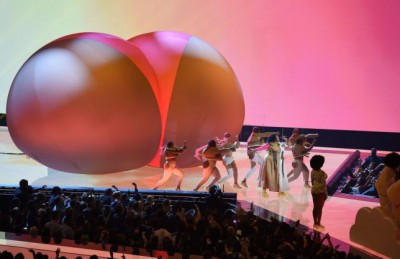- Because Our Children Are Watching
- Join the Cause
- Donate
Written by PTC | Published August 27, 2019

"Nickelodeon isn't just SpongeBob Squarepants: It's a gateway station to crotch- grabbing MTV. With millions of viewers, Nickelodeon offers the perfect cross-marketing vehicle for Viacom: Kids love it; parents trust its programming." -Christine Parsons, San Francisco ChronicleLast night marked the 35th annual Video Music Awards on MTV, a program far more widely known for courting controversy than celebrating music. It was during the VMAs that Madonna famously shared a kiss on stage with both Britney Spears and Christina Aguilara. It was during the VMAs that Miley Cyrus famously twerked her way to notoriety. Yet despite, or maybe because of this, the executives at Viacom have chosen to simultaneously air the Video Music Awards on MTV’s sister network, Nickelodeon – which was launched, and is still widely recognized as the first cable channel for children. This year’s VMAs featured a nearly constant torrent of partially-bleeped (but still recognizable) f-words and s-words; barely-there costuming; crotch-grabbing, thrusting, highly-sexualized choreography; songs that made reference to meth, blunts, and alcohol; and best new artist nominee Lizzo performing in front of a giant balloon designed to look like a woman’s buttocks in a red thong that rhythmically bounced up and down with the music. Again -- this was all simultaneously airing on Nickelodeon, which still offers kid-centric programming like SpongeBob SquarePants, The Loud House, Rise of the Teenage Mutant Ninja Turtles, Power Rangers, Henry Danger, Knight Squad, Paw Patrol, and Rusty Rivets. And much of this content was front-loaded in the broadcast, so the “bouncing booty balloon” aired during the first hour of primetime, when most children are still awake and in the TV viewing audience. Let this be a wake-up call and reality check for parents everywhere. Why would Viacom do this? Quite simply, they are trying to groom the next generation of MTV fans, and they don’t care about the toxic messages they are dumping into young hearts and minds. Parents need to be worried about MTV not only because of its popularity, but also because of its tremendous influence in the lives of America's teens and pre-teens. Surveys have shown MTV to be the most recognized network among young adults ages 12 to 34, watched by 73% of boys and 78% of girls ages 12 to 19. Boys watch for an average of 6.6 hours per week and girls watch for an average of 6.2 hours per week. And MTV is an incredibly influential brand, helping to shape the values of each succeeding generation of youngsters. According to Dr. Jane Brown of the University of North Carolina-Chapel Hill, "If you believe Sesame Street taught your four-year-old something, then you better believe MTV is teaching your 14-year-old something, because the influence doesn't stop when we come to a certain age." Indeed, research shows that watching MTV changes the attitudes and perceptions of young viewers. At least two experiments show that watching MTV results in more permissive attitudes about sex. One experiment showed that college students who were assigned to watch MTV developed more liberal attitudes toward premarital sex than their peers who did not watch MTV as part of the study. The second found that seventh and ninth graders were more likely to approve of premarital sex after watching MTV for one hour. Other studies have shown that greater exposure to and greater involvement with sexual content on TV leads to a stronger endorsement of recreational sex, higher expectations of the sexual activity of one's peers, and more extensive sexual experience. Similarly, studies on mass media influences on sexuality conclude that people who watch television programs containing depictions of attractive characters who enjoy having sexual intercourse and rarely suffer any negative consequences will be likely to imitate the behavior. Media audiences are most likely to learn that sex is consequence-free, rarely planned, and more a matter of lust than love. They are also likely to learn patterns of aggressive sexual behavior. And it's not just the sexual messages on MTV that influence teen behavior – though such content is the most common. According to the Institute on Media and the Family, even modest viewing of MTV and other music videos results in significant exposure to glamorized depictions of alcohol and tobacco use, alcohol use linked with sexuality, and violence and weapons. Violent lyric content can also contribute to teens' desensitization to violence. It's bad enough that Viacom uses the already irredeemably trashy MTV network to peddle drugs, alcohol, sex, vulgarity and violence to teens. Now they are also using a children’s network to push it on even younger children.